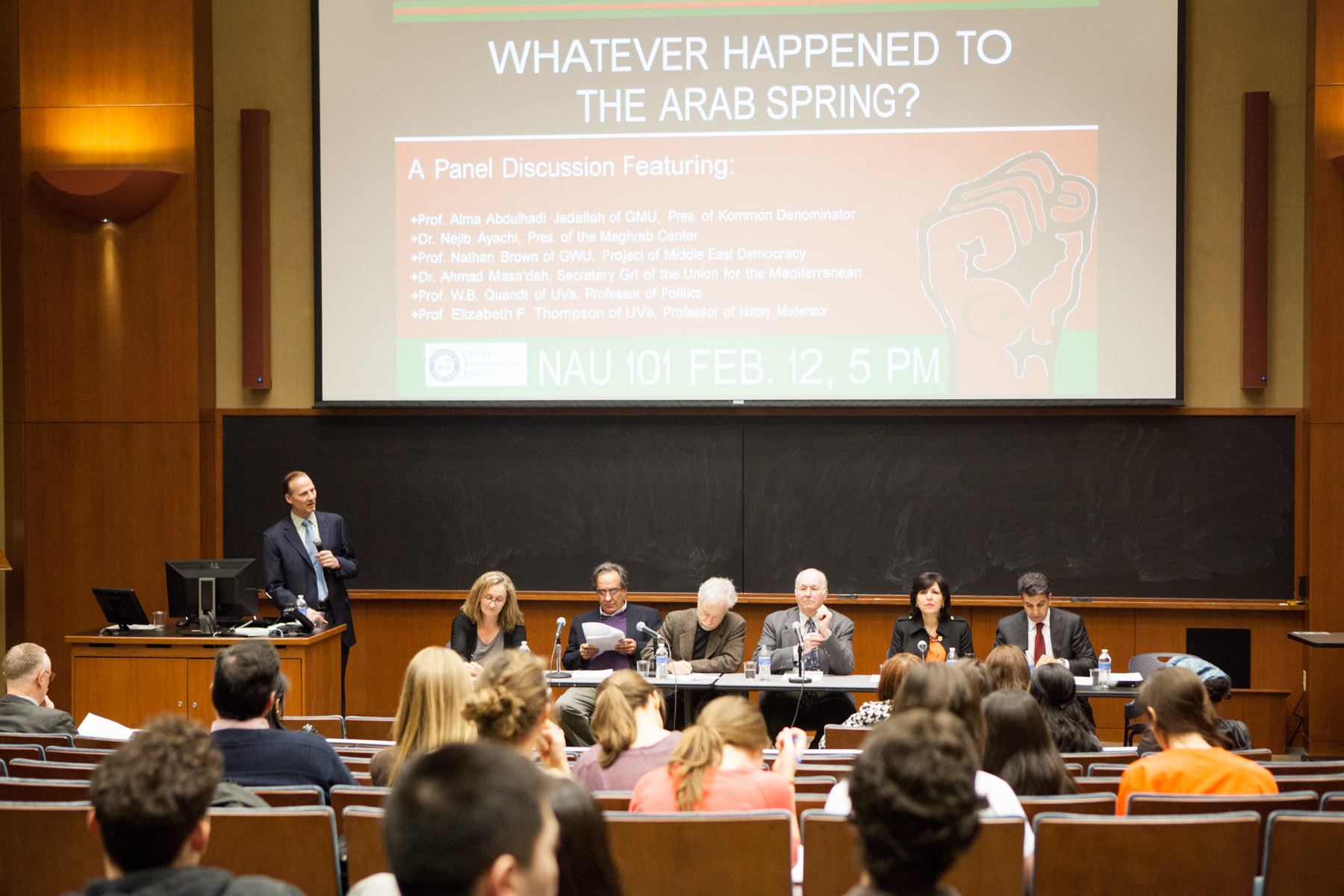On the day President Obama pledged in his State of the Union address that the U.S would “support stable transitions of democracy” in the Middle East, experts at the University of Virginia said a long view must be taken as countries adjust to changes spurred by the Arab Spring.
Rulers in Tunisia, Egypt, Libya and Yemen were forced from power in the past two years and major anti-authoritarian protests have broken out in many other countries, most notably in Syria. Earlier this week, the United Nations’ high commissioner for human rights told the U.N. Security Council the death toll in Syria is “probably now approaching 70,000.”
Speaking Tuesday evening in the Nau Hall auditorium as part of a panel discussion, William B. Quandt, Edward R Stettinius Jr. Professor Emeritus of Government & Foreign Affairs in the College of Arts & Sciences, said the speedy overthrows of leaders in Tunisia and Egypt should not fool people into thinking that transitions will be quick and easy.
“I worry about the sort of instant analysis snapshot of the Arab Spring when you look at it in a moment in time and say ‘Oh my gosh, it failed,’” he said.
Instead, Quandt said the Arab Spring and its continuing aftermath should be looked at “as a very long play with many acts, a very complicated novel with many plot turns.”
Jordan’s former ambassador to the European Union, Ahmad Masa’deh, a 1992 graduate of U.Va. Law’s LL.M master’s program, echoed that sentiment and said the events in the Middle East should be termed the “Arab Political Awakening,” because spring is a season that comes to an end and events are continuing to unfold in the Middle East.
He listed four geo-political reasons for the unrest.
“There has been a total failure in achieving peace and security in the greater Middle East area, including Afghanistan,” he said.
Masa’deh cited high unemployment rates in the Arab world, noting that 70 percent of the population is under the age of 40 and action is needed to increase employment. “So basically, you either have an opportunity at your hand, or a bomb.” He said the failure of the peace process between the Arabs and Israelis is also a cause. “And finally, there is also a chronic failure by the Arab autocratic regimes to introduce any proper democracy, pluralism or freedoms in their countries.”
“Those overarching reasons led the people to take to the streets to call for their dignity, freedom, pluralism and probably most importantly, their economic prosperity and better living conditions,” he said.
Nathan Brown, a George Washington University professor of political science and international affairs, spoke a lot about Egypt. He said the protests have spurred more political discussion in the country, where previously political authority was concentrated in the hands of a few people for their own purposes. Now the attitude is “We’ll never get anything right until we correct that,” he said.
Alma Abdulhadi Jadallah, president of Kommon Denominator, a conflict-management consulting firm, said neutral and impartial third-party actors can play a positive role. “We need processes that are inclusive, legitimate in the eyes of the people, that are fair and address grievances, and more importantly, create reconciliation.”
“We need to think of ourselves as gifted with big ears, so we can listen; wide eyes to see through a wider lens; a big heart, so we can feel the pain and emotions that are being expressed; and finally, equip ourselves with a toolkit that is culturally sensitive,” she said.
During a question-and-answer session, an audience member asked panelists why they thought Obama rejected his top advisers’ suggestion to arm the Syrian opposition. Quandt said the president made the right choice. “There is no lack of arms getting to the opposition. What is needed is a full-court diplomatic effort to end the killing and start some sort of process. The longer it goes, the more things will fragment into sectarian ‘statelets’ – it could be a horror story.”
Masa’deh also spoke about the Arab Spring Monday at the Law School. You can view his presentation here.
The Center for International Studies sponsored Tuesday’s conference, “What Ever Happened to the Arab Spring?” Its seminar series on development was to kick off Thursday with talks on economic development in Brazil, and gender, development and war in Afghanistan and Uganda.
On March 20, Robert Fatton, Julia Allen Cooper Professor of Politics, will present “Haiti’s Neo-Liberal Regime: The Making of an Outer-Periphery” at 5 p.m. in Hotel A. On March 27 at the same time and place, politics professor Herman Schwartz will ask, “Does a post-scarcity world mean an end to development?”
Media Contact
Article Information
February 14, 2013
/content/experts-uva-long-view-needed-when-assessing-arab-spring

